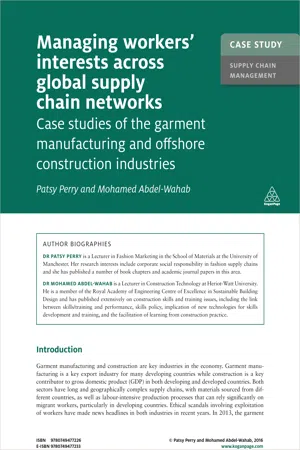
Case Study: Managing Workers' Interests Across Global Supply Chains Networks
Case Studies of the Garment Manufacturing and Offshore Construction Industries
- English
- ePUB (mobile friendly)
- Available on iOS & Android
Case Study: Managing Workers' Interests Across Global Supply Chains Networks
Case Studies of the Garment Manufacturing and Offshore Construction Industries
About This Book
This case study focuses on a UK-based designer knitwear manufacturer and retailer, involved in global outsourcing and retailing activities of own-brand products as well as contract manufacturing for other fashion brands.The case analyses the high environmental impact of the fashion industry, in terms of its carbon, water and waste footprint. It is under increased pressure from various stakeholders to balance the triple bottom line (TBL); environmental, social and economic needs. The case study highlights the difficulties in managing global supply chains when it comes to corporate social responsibility and protecting workers' interests. It also illustrates how a region's labour laws and historical relationships with Western clients can embed the importance of ethical behaviour alongside modern cost and lead time cutting demands. The authors examine globally dispersed fashion supply chains which have potentially negative impacts for people and the planet. It highlights the fact that for fashion businesses, it's a challenge to incorporate sustainability when the critical success factors are cost efficiency and effectiveness. Aimed at students on logistics, supply chain management and fashion courses, readers are provided with tools and ideas for sustainability and presented with questions about challenges to the fashion industry as well as some interesting suggested solutions.
Frequently asked questions
Information
Managing workers’ interests across global supply chain networks

Introduction
Table of contents
- Managing workers’ interests across global supply chain networks